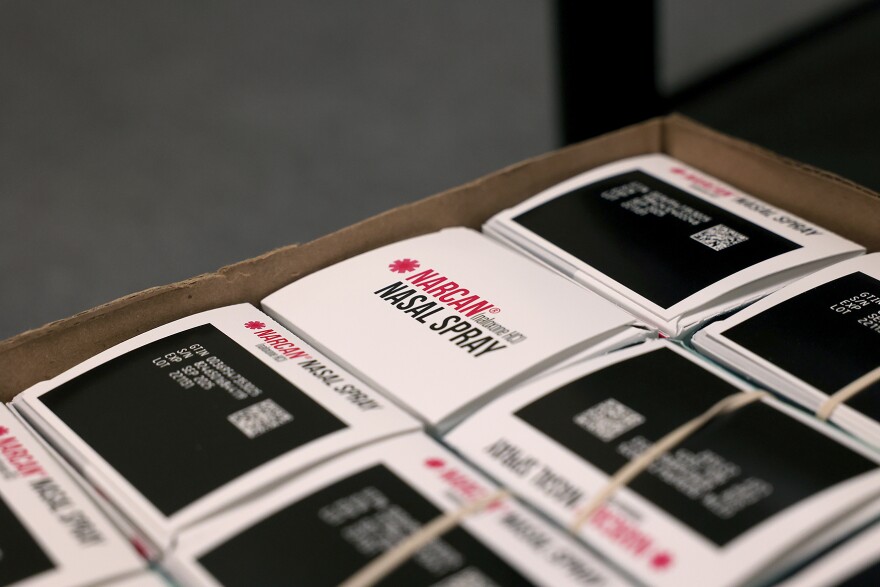According to a leaked budget document, The U.S. Department of Health and Human Services appears poised to cut a $56 million annual grant program that pays for states to receive the overdose reversal medication naloxone, commonly known as Narcan.
Missouri officials are worried the potential cut would reverse statewide efforts to reduce overdose deaths.
"We would have to start triaging pretty seriously to figure out who needs it the most critically," said Greg Boal, the first responder training coordinator at the Missouri Institute of Mental Health (MIMH). "That's not a position we want to put first responder agencies in when it comes to life-saving care."
In addition to funding naloxone distribution across the state, the grant on the chopping block also helps MIMH provide training to first responders on how to properly respond to overdose calls.
Andrew Worrall, a sergeant with the Ashland Police Department and instructor on opioid addiction and naloxone administration, said the program helps prevent further overdoses by reducing stigma and teaching police, fire and EMS workers to better understand substance use disorders.
"The language that we use, the specific verbiage that we use — we don't necessarily want to make people feel bad about what they're doing and instead offer them the resources that we've got locally," Worrall said.
MIMH data shows overdose deaths in Missouri have steadily declined since the project began, including by 23% from 2023 to 2024.
Worrall said the program is necessary to maintain first responders' well-being, too.
"The more we have to respond to these overdose crises, it can be frustrating. It can be tiring," Worrall said. "When we can assist people and connect them with different resources, we can move on."
Of the more than 700 overdose events MIMH-trained first responders have encountered since late 2023, nearly 90% were successful overdose reversals, Boal said.
But the success of the program doesn't mean the work is over, he added.
"As long as the drug supply in the United States and in Missouri is as risky and as lethal as it is, we need to really maintain all hands on deck," Boal said. "We just can't prepare and plan to keep all hands on deck when we don't have all the information available about what our funding will look like in six months to a year from now."
Boal said first responder agencies across the state have expressed concern about accessing naloxone — and training on how to use it — if the grant funding is cut.
Though it wouldn't mean all money for the program is lost, Boal said it would cause a "significant" decrease in what the agency is able to provide.
According to the MIMH's annual report, the grant in question funded the purchase of 8,136 naloxone kits in 2024.
Boal said the program also represents a cost-savings for Missouri's tax base, because emergency response, EMS transport and hospitalizations are expensive to taxpayers — an emergency room visit for an overdose costs more than $3,000 in 2025, Boal said, but a grant-funded naloxone kit costs only $30.
"It's important for us to have as much information as we can have to have effective long-term planning, and we just don't have that information right now," Boal said, adding that the MIMH's arguments for maintaining funding were sent to the Missouri Department of Health and Senior Services, which administers grant funding to MIMH.
The department did not respond to a request for comment from KBIA.
Boal also said the proposed cut appears to defy the Trump Administration's Statement of Drug Policy Priorities. Published earlier this month, it names expanding "access to overdose prevention education and life-saving opioid overdose reversal medications like naloxone" as a key priority.
"On the one hand, we see the current administration has outlined very explicitly in their publications saying that they very much value and prioritize naloxone distribution and training," Boal said. "But then this document comes out."
In a written statement to KBIA, a spokesperson for the Substance Abuse and Mental Health Services Administration, which provides the grant money, said, "As of February 2025, FR-CARA recipients have have trained over 66,000 individuals to administer naloxone, and distributed over 282,500 naloxone kits in FY24."
They added, "Current funding status for all awards is available on SAMHSA's Grants Dashboard."
No grant applications for the next fiscal year appear to have opened on the website's dashboard. Though the budget cut isn't final, by mid-April last year, applications for the funding had already closed.
Copyright 2025 KBIA




